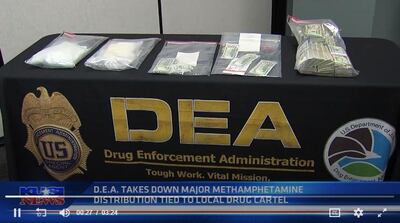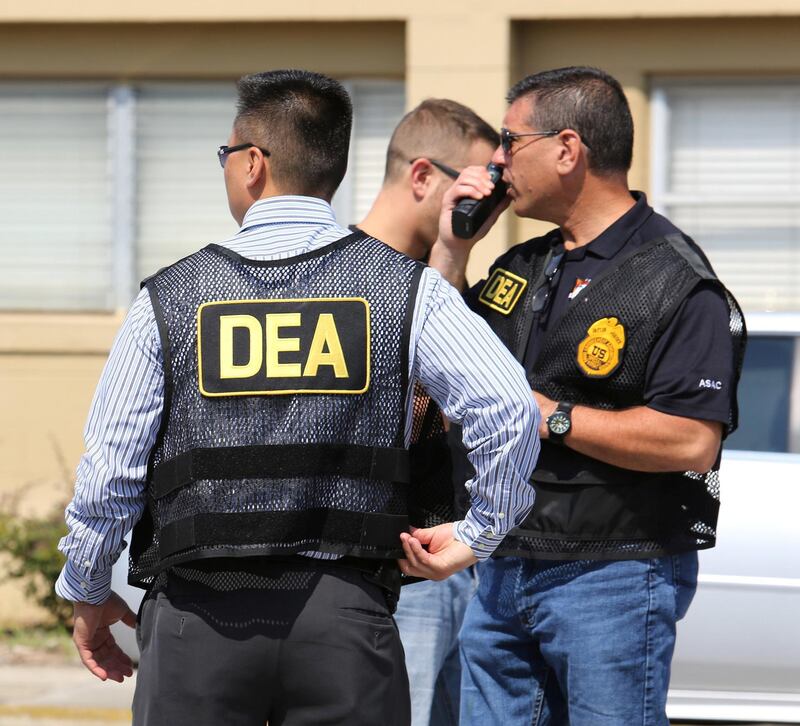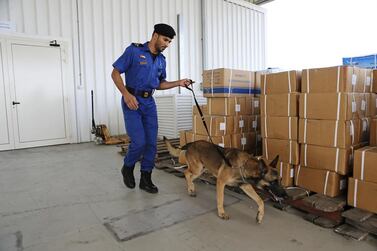Suspected members of a methamphetamine distribution network with links to an infamous Mexican crime cartel have been charged in the United States with shipping drugs to the UAE.
Prosecutors in California believe that a San Diego-based network shipped large quantities of methamphetamine and gamma-hydroxybutyrate (GHB) across the United States and internationally.
The UAE was among the locations to which drugs were sent to sub-distributors, according to the US Attorney’s Office in the Southern District of California.
Abu Dhabi Police were thanked by Robert Brewer, US attorney for the district, who described the force’s help as “vital” in the success of the year-long operation.
In total, 43 members of the alleged distribution network, which is tied to the Sinaloa Cartel, were charged in the US this week with federal drug trafficking and money laundering offenses. In coordinated raids early on Tuesday, investigators seized around 36kg of methamphetamine, also known as crystal meth. They also discovered four firearms and more than $100,000.
It is claimed that the drugs were shipped weekly through services such as FedEx and the United States Postal Service, and were paid for with shipments of cash, deposits into bank accounts and through online money transfer systems such as PayPal, Venmo, Zelle and Cash App.
“We have completely dismantled this San Diego-based international drug trafficking network with ties to the Sinaloa Cartel,” said Mr Brewer. “I want to congratulate the outstanding federal, state, and local law enforcement cooperation that resulted in this highly successful investigation.
"Replicating this kind of aggressive law enforcement takedown is critical to breaking the backs of these criminal networks and continuing our efforts against the Sinaloa Cartel.”
The drug shipments were mailed weekly to various hotels, residences, and Airbnb locations, in locations that also included California, Arizona, Oregon, Wyoming, Texas, Arkansas, Florida, Virginia, Washington DC, New Jersey and New York, it is claimed.
The Sinaloa Cartel is seen as one of the most powerful drug trafficking networks in the world. Founded in the 1980s, it dominates much of north-west Mexico and makes billions of dollars from trafficking illicit narcotics to the United States, Europe and Asia.

Its former leader, Joaquín 'El Chapo' Guzmán, was convicted of offences including the distribution of cocaine and heroin, illegal firearms possession and money laundering at a trial earlier this year.
The group has used brutal tactics, with Guzmán said to have used hitmen to carry out "hundreds" of murders, assaults, kidnappings and acts of torture on rivals.
As part of the trafficking scheme, the defendants are said to have created multiple fraudulent FedEx accounts. These fraudulent FedEx accounts were billed to and paid for by large corporations, in hopes that the large businesses would not notice the illicit packages.
As of Tuesday, 32 of those charged were in custody, with a further 11 on the run.
Investigative techniques used by police including physical surveillance, obtaining phone records, financial documents tracking warrants on telephones and vehicles and undercover agents.
“The Sinaloa Cartel relies on members of our communities to distribute their drugs,” said Karen Flowers, a Drug Enforcement Agency (DEA) agent in charge of the operation.
“Because they manipulate our commercial distribution routes to make a buck, our streets are flooded with high purity and low cost methamphetamine.
“Without their distribution networks, cartels would not be able to operate drug businesses that rival Fortune 500 companies and dangerous drugs, like methamphetamine, would be scarce, expensive and of low purity.
“The operation will ultimately disrupt the supply chain, diminish profits and make it harder for the Sinaloa Cartel to do business in the United States."







